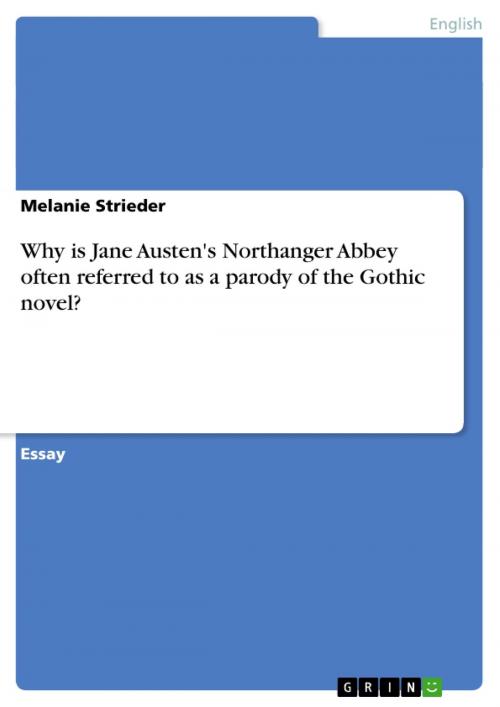Why is Jane Austen's Northanger Abbey often referred to as a parody of the Gothic novel?
Fiction & Literature, Literary Theory & Criticism, British| Author: | Melanie Strieder | ISBN: | 9783638376440 |
| Publisher: | GRIN Publishing | Publication: | May 10, 2005 |
| Imprint: | GRIN Publishing | Language: | English |
| Author: | Melanie Strieder |
| ISBN: | 9783638376440 |
| Publisher: | GRIN Publishing |
| Publication: | May 10, 2005 |
| Imprint: | GRIN Publishing |
| Language: | English |
Essay from the year 2003 in the subject English Language and Literature Studies - Literature, grade: 2,0, University of Duisburg-Essen, 4 entries in the bibliography, language: English, abstract: Why is Jane Austen's Northanger Abbey often referred to as a parody of the Gothic novel?_ Jane Austen (1775-1817) is often regarded as the greatest English female novelist. Her novels are praised for their underlieing social comedy and thorough description of human relationships. She lived and worked during a time predominated by novels of sentiment, sensation and sensibility. However she stayed aloof from this literary style and especially her novel Northanger Abbey is often regarded to as a parody of the Gothic novel. Main authors of these so called 'Gothic' romances are for example Ann Radcliffe, Horace Walpole and M.G. Lewis. The Gothic novel has its origins in the Middle Ages and deals with mysterious, frightening, fantastic, supernatural, sexual and sublime things. The stories seem rather ridiculous to us today. The reader always finds similar characters and plots in those novels: 'the tyrannical father, the importunate and unscrupulous suitor, the hero and heroine of sensibility and of mysterious but noble birth, the confidante[...], the chaperone.'1 The heroine is always unbelievable beautiful but weak and virtuous. Then she is threatened by a veil man and saved by the hero in the end. In contrast to such a story Jane Austen's Northanger Abbey is often considered as a 'amusing and bitingly satirical pastiche of the 'Gothic' romances popular in her day.'2 [...] _____ 1 Mudrick, Marvin: Irony versus Gothicism. In: Jane Austen: Northanger Abbey and Persuasion. Edited by B.C. Southam. MacMillan Education Ltd. Hampshire, London. 1986 (Casebook Series); page 75 2 Austen, Jane: Northanger Abbey. Penguin Popular Classics. London. 1994; blurb
Essay from the year 2003 in the subject English Language and Literature Studies - Literature, grade: 2,0, University of Duisburg-Essen, 4 entries in the bibliography, language: English, abstract: Why is Jane Austen's Northanger Abbey often referred to as a parody of the Gothic novel?_ Jane Austen (1775-1817) is often regarded as the greatest English female novelist. Her novels are praised for their underlieing social comedy and thorough description of human relationships. She lived and worked during a time predominated by novels of sentiment, sensation and sensibility. However she stayed aloof from this literary style and especially her novel Northanger Abbey is often regarded to as a parody of the Gothic novel. Main authors of these so called 'Gothic' romances are for example Ann Radcliffe, Horace Walpole and M.G. Lewis. The Gothic novel has its origins in the Middle Ages and deals with mysterious, frightening, fantastic, supernatural, sexual and sublime things. The stories seem rather ridiculous to us today. The reader always finds similar characters and plots in those novels: 'the tyrannical father, the importunate and unscrupulous suitor, the hero and heroine of sensibility and of mysterious but noble birth, the confidante[...], the chaperone.'1 The heroine is always unbelievable beautiful but weak and virtuous. Then she is threatened by a veil man and saved by the hero in the end. In contrast to such a story Jane Austen's Northanger Abbey is often considered as a 'amusing and bitingly satirical pastiche of the 'Gothic' romances popular in her day.'2 [...] _____ 1 Mudrick, Marvin: Irony versus Gothicism. In: Jane Austen: Northanger Abbey and Persuasion. Edited by B.C. Southam. MacMillan Education Ltd. Hampshire, London. 1986 (Casebook Series); page 75 2 Austen, Jane: Northanger Abbey. Penguin Popular Classics. London. 1994; blurb















